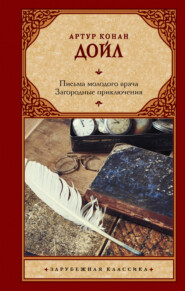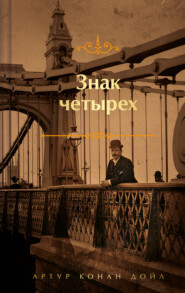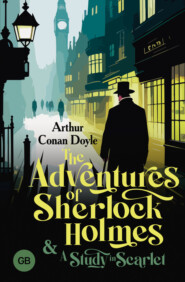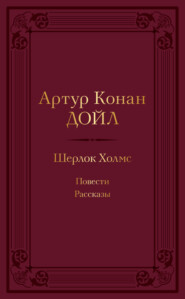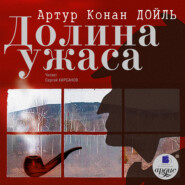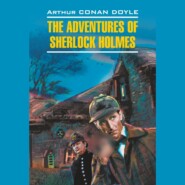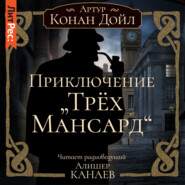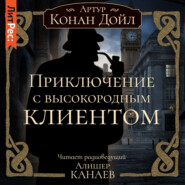По всем вопросам обращайтесь на: info@litportal.ru
(©) 2003-2024.
✖
Знак четырех / The Sign of the Four
Настройки чтения
Размер шрифта
Высота строк
Поля
‘Though unsatisfactory, my research has not been entirely barren,’ he observed, staring up at the ceiling with dreamy, lack-lustre eyes. ‘Subject to your correction, I should judge that the watch belonged to your elder brother, who inherited it from your father.’
‘That you gather, no doubt, from the H. W. upon the back?’
‘Quite so. The W. suggests your own name. The date of the watch is nearly fifty years back, and the initials are as old as the watch: so it was made for the last generation. Jewellery usually descends to the eldest son, and he is most likely to have the same name as the father. Your father has, if I remember right, been dead many years. It has, therefore, been in the hands of your eldest brother.’
‘Right, so far,’ said I. ‘Anything else?’
‘He was a man of untidy habits – very untidy and careless. He was left with good prospects, but he threw away his chances, lived for some time in poverty with occasional short intervals of prosperity, and finally, taking to drink, he died. That is all I can gather.’
I sprang from my chair and limped impatiently about the room with considerable bitterness in my heart.
‘This is unworthy of you, Holmes,’ I said. ‘I could not have believed that you would have descended to this. You have made inquiries into the history of my unhappy brother, and you now pretend to deduce this knowledge in some fanciful way. You cannot expect me to believe that you have read all this from his old watch! It is unkind and, to speak plainly, has a touch of charlatanism in it.’
‘My dear doctor,’ said he kindly, ‘pray accept my apologies. Viewing the matter as an abstract problem, I had forgotten how personal and painful a thing it might be to you. I assure you, however, that I never even knew that you had a brother until you handed me the watch.’
‘Then how in the name of all that is wonderful[21 - In the name of all that is wonderful– во имя всего святого.] did you get these facts? They are absolutely correct in every particular.’
‘Ah, that is good luck. I could only say what was the balance of probability. I did not at all expect to be so accurate.’
‘But it was not mere guesswork?’
‘No, no: I never guess. It is a shocking habit – destructive to the logical faculty. What seems strange to you is only so because you do not follow my train of thought or observe the small facts upon which large inferences may depend. For example, I began by stating that your brother was careless. When you observe the lower part of that watch-case you notice that it is not only dinted in two places but it is cut and marked all over from the habit of keeping other hard objects, such as coins or keys, in the same pocket. Surely it is no great feat to assume that a man who treats a fifty-guinea watch so cavalierly must be a careless man. Neither is it a very far-fetched inference that a man who inherits one article of such value is pretty well provided for in other respects.’
I nodded to show that I followed his reasoning.
‘It is very customary for pawnbrokers in England, when they take a watch, to scratch the numbers of the ticket with a pinpoint upon the inside of the case. It is more handy than a label as there is no risk of the number being lost or transposed. There are no less than four such numbers visible to my lens on the inside of this case. Inference – that your brother was often at low water.[22 - Was often at low water– выражение соответствует русскому «частенько был «на мели».] Secondary inference – that he had occasional bursts of prosperity, or he could not have redeemed the pledge. Finally, I ask you to look at the inner plate, which contains the keyhole. Look at the thousands of scratches all round the hole – marks where the key has slipped. What sober man’s key could have scored those grooves? But you will never see a drunkard’s watch without them. He winds it at night, and he leaves these traces of his unsteady hand. Where is the mystery in all this?’
‘It is as clear as daylight,’ I answered. ‘I regret the injustice which I did you. I should have had more faith in your marvellous faculty. May I ask whether you have any professional inquiry on foot at present?’
‘None. Hence the cocaine. I cannot live without brainwork. What else is there to live for? Stand at the window here. Was ever such a dreary, dismal, unprofitable world? See how the yellow fog swirls down the street and drifts across the dun-coloured houses. What could be more hopelessly prosaic and material? What is the use of having powers, Doctor, when one has no field upon which to exert them? Crime is commonplace, existence is commonplace, and no qualities save those which are commonplace have any function upon earth.’
I had opened my mouth to reply to this tirade when, with a crisp knock, our landlady entered, bearing a card upon the brass salver.
‘A young lady for you, sir,’ she said, addressing my companion.
‘Miss Mary Morstan,’ he read. ‘Hum! I have no recollection of the name. Ask the young lady to step up, Mrs. Hudson. Don’t go, Doctor. I should prefer that you remain.’
Chapter 2: The Statement of the Case
Miss Morstan entered the room with a firm step and an outward composure of manner. She was a blonde young lady, small, dainty, well gloved, and dressed in the most perfect taste. There was, however, a plainness and simplicity about her costume which bore with it a suggestion of limited means.[23 - Limited means– ограниченные средства.] The dress was a sombre grayish beige, untrimmed and unbraided, and she wore a small turban of the same dull hue, relieved only by a suspicion of white feather in the side. Her face had neither regularity of feature nor beauty of complexion, but her expression was sweet and amiable, and her large blue eyes were singularly spiritual and sympathetic. In an experience of women which extends over many nations and three separate continents, I have never looked upon a face which gave a clearer promise of a refined and sensitive nature. I could not but observe that as she took the seat which Sherlock Holmes placed for her, her lip trembled, her hand quivered, and she showed every sign of intense inward agitation.
‘I have come to you, Mr. Holmes,’ she said, ‘because you once enabled my employer, Mrs. Cecil Forrester, to unravel a little domestic complication. She was much impressed by your kindness and skill.’
‘Mrs. Cecil Forrester,’ he repeated thoughtfully. ‘I believe that I was of some slight service to her. The case, however, as I remember it, was a very simple one.’
‘She did not think so. But at least you cannot say the same of mine. I can hardly imagine anything more strange, more utterly inexplicable, than the situation in which I find myself.’
Holmes rubbed his hands, and his eyes glistened. He leaned forward in his chair with an expression of extraordinary concentration upon his clear-cut, hawk-like features.
‘State your case,’ said he in brisk business tones.
I felt that my position was an embarrassing one.
‘You will, I am sure, excuse me,’ I said, rising from my chair.
To my surprise, the young lady held up her gloved hand to detain me.
‘If your friend,’ she said, ‘would be good enough to stop, he might be of inestimable service to me.’
I relapsed into my chair.
‘Briefly,’ she continued, ‘the facts are these. My father was an officer in an Indian regiment, who sent me home when I was quite a child. My mother was dead, and I had no relative in England. I was placed, however, in a comfortable boarding establishment at Edinburgh, and there I remained until I was seventeen years of age. In the year 1878 my father, who was senior captain of his regiment, obtained twelve months’ leave and came home. He telegraphed to me from London that he had arrived all safe and directed me to come down at once, giving the Langham Hotel as his address. His message, as I remember, was full of kindness and love. On reaching London I drove to the Langham and was informed that Captain Morstan was staying there, but that he had gone out the night before and had not returned. I waited all day without news of him. That night, on the advice of the manager of the hotel, I communicated with the police, and next morning we advertised in all the papers. Our inquiries led to no result; and from that day to this no word has ever been heard of my unfortunate father. He came home with his heart full of hope to find some peace, some comfort, and instead – ’
She put her hand to her throat, and a choking sob cut short the sentence.
‘The date?’ asked Holmes, opening his notebook.
‘He disappeared upon the third of December, 1878 – nearly ten years ago.’
‘His luggage?’
‘Remained at the hotel. There was nothing in it to suggest a clue – some clothes, some books, and a considerable number of curiosities from the Andaman Islands. He had been one of the officers in charge of the convict-guard[24 - One of the officers in charge of the convict-guard– один из офицеров, отвечающих за охрану осужденных.] there.’
‘Had he any friends in town?’
‘Only one that we know of – Major Sholto, of his own regiment, the Thirty-fourth Bombay Infantry. The major had retired some little time before and lived at Upper Norwood. We communicated with him, of course, but he did not even know that his brother officer was in England.’
‘A singular case,’ remarked Holmes.
‘I have not yet described to you the most singular part. About six years ago – to be exact, upon the fourth of May, 1882 – an advertisement appeared in the Times asking for the address of Miss Mary Morstan, and stating that it would be to her advantage to come forward. There was no name or address appended. I had at that time just entered the family of Mrs. Cecil Forrester in the capacity of governess. By her advice I published my address in the advertisement column. The same day there arrived through the post a small cardboard box addressed to me, which I found to contain a very large and lustrous pearl. No word of writing was enclosed. Since then every year upon the same date there has always appeared a similar box, containing a similar pearl, without any clue as to the sender. They have been pronounced by an expert to be of a rare variety and of considerable value. You can see for yourself that they are very handsome.’
She opened a flat box as she spoke and showed me six of the finest pearls that I had ever seen.
‘Your statement is most interesting,’ said Sherlock Holmes. ‘Has anything else occurred to you?’
‘Yes, and no later than to-day. That is why I have come to you. This morning I received this letter, which you will perhaps read for yourself.’
‘Thank you,’ said Holmes. ‘The envelope, too, please. Post-mark, London, S. W. Date, July 7. Hum! Man’s thumbmark on corner – probably postman. Best quality paper. Envelopes at sixpence a packet. Particular man in his stationery. No address.
‘“Be at the third pillar from the left outside the Lyceum Theatre to-night at seven o’clock. If you are distrustful[25 - Be distrustful– не доверять; образовано от существительного trust– вера, доверие.] bring two friends. You are a wronged woman[26 - You are a wronged woman– С вами обошлись несправедливо (от wrong– неправильный).] and shall have justice. Do not bring police. If you do, all will be in vain. Your unknown friend.”
‘Well, really, this is a very pretty little mystery! What do you intend to do, Miss Morstan?’
‘That is exactly what I want to ask you.’
‘Then we shall most certainly go – you and I and – yes, why Dr. Watson is the very man. Your correspondent says two friends. He and I have worked together before.’
‘But would he come?’ she asked with something appealing in her voice and expression.
‘That you gather, no doubt, from the H. W. upon the back?’
‘Quite so. The W. suggests your own name. The date of the watch is nearly fifty years back, and the initials are as old as the watch: so it was made for the last generation. Jewellery usually descends to the eldest son, and he is most likely to have the same name as the father. Your father has, if I remember right, been dead many years. It has, therefore, been in the hands of your eldest brother.’
‘Right, so far,’ said I. ‘Anything else?’
‘He was a man of untidy habits – very untidy and careless. He was left with good prospects, but he threw away his chances, lived for some time in poverty with occasional short intervals of prosperity, and finally, taking to drink, he died. That is all I can gather.’
I sprang from my chair and limped impatiently about the room with considerable bitterness in my heart.
‘This is unworthy of you, Holmes,’ I said. ‘I could not have believed that you would have descended to this. You have made inquiries into the history of my unhappy brother, and you now pretend to deduce this knowledge in some fanciful way. You cannot expect me to believe that you have read all this from his old watch! It is unkind and, to speak plainly, has a touch of charlatanism in it.’
‘My dear doctor,’ said he kindly, ‘pray accept my apologies. Viewing the matter as an abstract problem, I had forgotten how personal and painful a thing it might be to you. I assure you, however, that I never even knew that you had a brother until you handed me the watch.’
‘Then how in the name of all that is wonderful[21 - In the name of all that is wonderful– во имя всего святого.] did you get these facts? They are absolutely correct in every particular.’
‘Ah, that is good luck. I could only say what was the balance of probability. I did not at all expect to be so accurate.’
‘But it was not mere guesswork?’
‘No, no: I never guess. It is a shocking habit – destructive to the logical faculty. What seems strange to you is only so because you do not follow my train of thought or observe the small facts upon which large inferences may depend. For example, I began by stating that your brother was careless. When you observe the lower part of that watch-case you notice that it is not only dinted in two places but it is cut and marked all over from the habit of keeping other hard objects, such as coins or keys, in the same pocket. Surely it is no great feat to assume that a man who treats a fifty-guinea watch so cavalierly must be a careless man. Neither is it a very far-fetched inference that a man who inherits one article of such value is pretty well provided for in other respects.’
I nodded to show that I followed his reasoning.
‘It is very customary for pawnbrokers in England, when they take a watch, to scratch the numbers of the ticket with a pinpoint upon the inside of the case. It is more handy than a label as there is no risk of the number being lost or transposed. There are no less than four such numbers visible to my lens on the inside of this case. Inference – that your brother was often at low water.[22 - Was often at low water– выражение соответствует русскому «частенько был «на мели».] Secondary inference – that he had occasional bursts of prosperity, or he could not have redeemed the pledge. Finally, I ask you to look at the inner plate, which contains the keyhole. Look at the thousands of scratches all round the hole – marks where the key has slipped. What sober man’s key could have scored those grooves? But you will never see a drunkard’s watch without them. He winds it at night, and he leaves these traces of his unsteady hand. Where is the mystery in all this?’
‘It is as clear as daylight,’ I answered. ‘I regret the injustice which I did you. I should have had more faith in your marvellous faculty. May I ask whether you have any professional inquiry on foot at present?’
‘None. Hence the cocaine. I cannot live without brainwork. What else is there to live for? Stand at the window here. Was ever such a dreary, dismal, unprofitable world? See how the yellow fog swirls down the street and drifts across the dun-coloured houses. What could be more hopelessly prosaic and material? What is the use of having powers, Doctor, when one has no field upon which to exert them? Crime is commonplace, existence is commonplace, and no qualities save those which are commonplace have any function upon earth.’
I had opened my mouth to reply to this tirade when, with a crisp knock, our landlady entered, bearing a card upon the brass salver.
‘A young lady for you, sir,’ she said, addressing my companion.
‘Miss Mary Morstan,’ he read. ‘Hum! I have no recollection of the name. Ask the young lady to step up, Mrs. Hudson. Don’t go, Doctor. I should prefer that you remain.’
Chapter 2: The Statement of the Case
Miss Morstan entered the room with a firm step and an outward composure of manner. She was a blonde young lady, small, dainty, well gloved, and dressed in the most perfect taste. There was, however, a plainness and simplicity about her costume which bore with it a suggestion of limited means.[23 - Limited means– ограниченные средства.] The dress was a sombre grayish beige, untrimmed and unbraided, and she wore a small turban of the same dull hue, relieved only by a suspicion of white feather in the side. Her face had neither regularity of feature nor beauty of complexion, but her expression was sweet and amiable, and her large blue eyes were singularly spiritual and sympathetic. In an experience of women which extends over many nations and three separate continents, I have never looked upon a face which gave a clearer promise of a refined and sensitive nature. I could not but observe that as she took the seat which Sherlock Holmes placed for her, her lip trembled, her hand quivered, and she showed every sign of intense inward agitation.
‘I have come to you, Mr. Holmes,’ she said, ‘because you once enabled my employer, Mrs. Cecil Forrester, to unravel a little domestic complication. She was much impressed by your kindness and skill.’
‘Mrs. Cecil Forrester,’ he repeated thoughtfully. ‘I believe that I was of some slight service to her. The case, however, as I remember it, was a very simple one.’
‘She did not think so. But at least you cannot say the same of mine. I can hardly imagine anything more strange, more utterly inexplicable, than the situation in which I find myself.’
Holmes rubbed his hands, and his eyes glistened. He leaned forward in his chair with an expression of extraordinary concentration upon his clear-cut, hawk-like features.
‘State your case,’ said he in brisk business tones.
I felt that my position was an embarrassing one.
‘You will, I am sure, excuse me,’ I said, rising from my chair.
To my surprise, the young lady held up her gloved hand to detain me.
‘If your friend,’ she said, ‘would be good enough to stop, he might be of inestimable service to me.’
I relapsed into my chair.
‘Briefly,’ she continued, ‘the facts are these. My father was an officer in an Indian regiment, who sent me home when I was quite a child. My mother was dead, and I had no relative in England. I was placed, however, in a comfortable boarding establishment at Edinburgh, and there I remained until I was seventeen years of age. In the year 1878 my father, who was senior captain of his regiment, obtained twelve months’ leave and came home. He telegraphed to me from London that he had arrived all safe and directed me to come down at once, giving the Langham Hotel as his address. His message, as I remember, was full of kindness and love. On reaching London I drove to the Langham and was informed that Captain Morstan was staying there, but that he had gone out the night before and had not returned. I waited all day without news of him. That night, on the advice of the manager of the hotel, I communicated with the police, and next morning we advertised in all the papers. Our inquiries led to no result; and from that day to this no word has ever been heard of my unfortunate father. He came home with his heart full of hope to find some peace, some comfort, and instead – ’
She put her hand to her throat, and a choking sob cut short the sentence.
‘The date?’ asked Holmes, opening his notebook.
‘He disappeared upon the third of December, 1878 – nearly ten years ago.’
‘His luggage?’
‘Remained at the hotel. There was nothing in it to suggest a clue – some clothes, some books, and a considerable number of curiosities from the Andaman Islands. He had been one of the officers in charge of the convict-guard[24 - One of the officers in charge of the convict-guard– один из офицеров, отвечающих за охрану осужденных.] there.’
‘Had he any friends in town?’
‘Only one that we know of – Major Sholto, of his own regiment, the Thirty-fourth Bombay Infantry. The major had retired some little time before and lived at Upper Norwood. We communicated with him, of course, but he did not even know that his brother officer was in England.’
‘A singular case,’ remarked Holmes.
‘I have not yet described to you the most singular part. About six years ago – to be exact, upon the fourth of May, 1882 – an advertisement appeared in the Times asking for the address of Miss Mary Morstan, and stating that it would be to her advantage to come forward. There was no name or address appended. I had at that time just entered the family of Mrs. Cecil Forrester in the capacity of governess. By her advice I published my address in the advertisement column. The same day there arrived through the post a small cardboard box addressed to me, which I found to contain a very large and lustrous pearl. No word of writing was enclosed. Since then every year upon the same date there has always appeared a similar box, containing a similar pearl, without any clue as to the sender. They have been pronounced by an expert to be of a rare variety and of considerable value. You can see for yourself that they are very handsome.’
She opened a flat box as she spoke and showed me six of the finest pearls that I had ever seen.
‘Your statement is most interesting,’ said Sherlock Holmes. ‘Has anything else occurred to you?’
‘Yes, and no later than to-day. That is why I have come to you. This morning I received this letter, which you will perhaps read for yourself.’
‘Thank you,’ said Holmes. ‘The envelope, too, please. Post-mark, London, S. W. Date, July 7. Hum! Man’s thumbmark on corner – probably postman. Best quality paper. Envelopes at sixpence a packet. Particular man in his stationery. No address.
‘“Be at the third pillar from the left outside the Lyceum Theatre to-night at seven o’clock. If you are distrustful[25 - Be distrustful– не доверять; образовано от существительного trust– вера, доверие.] bring two friends. You are a wronged woman[26 - You are a wronged woman– С вами обошлись несправедливо (от wrong– неправильный).] and shall have justice. Do not bring police. If you do, all will be in vain. Your unknown friend.”
‘Well, really, this is a very pretty little mystery! What do you intend to do, Miss Morstan?’
‘That is exactly what I want to ask you.’
‘Then we shall most certainly go – you and I and – yes, why Dr. Watson is the very man. Your correspondent says two friends. He and I have worked together before.’
‘But would he come?’ she asked with something appealing in her voice and expression.






